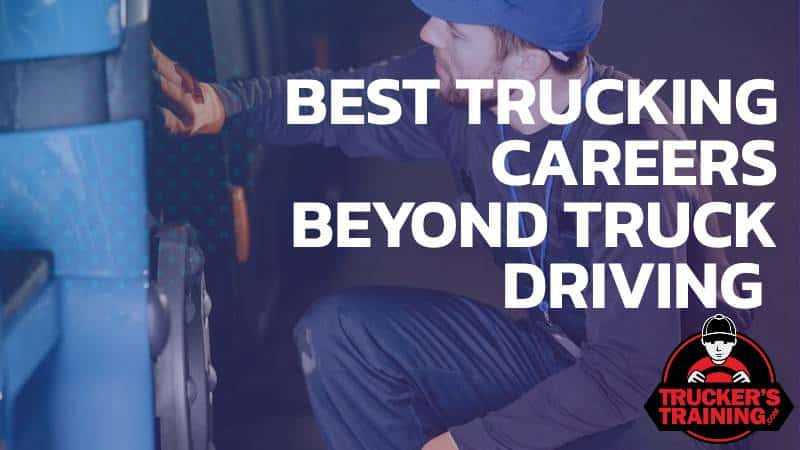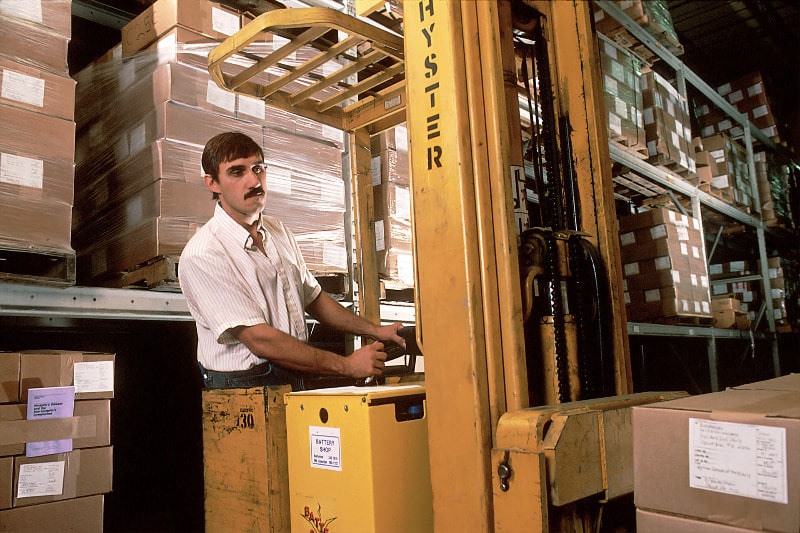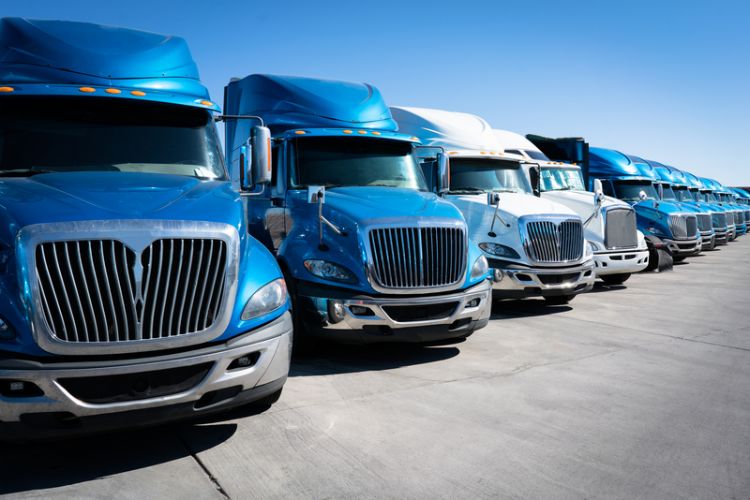
Ever wondered what else you can do in the trucking industry besides being a long haul truck driver, or driving a big rig in general? The trucking industry offers many fulfilling careers beyond just truck driving. Whether you’re looking to get off the road, move into a management role, or start a new career, there are plenty of options for you.
You might want to consider becoming a fleet manager, dispatcher, trucking company owner, or work in trucking logistics. These jobs provide stability, good pay, and a chance to build a lifelong career. A whole world of interesting jobs awaits—all you have to do is go after them.
1. Truck Driving Instructor

As a truck driving instructor, you get to teach new drivers the skills they need for a successful career behind the wheel. The job responsibilities are training students how to properly and safely operate a commercial truck, evaluating their progress, and helping them prepare for licensing exams.
The benefits of a CDL Instructor career are many:
- You get to shape the next generation of truckers.
- The job is rewarding since you’re helping others start new careers.
- You set your own hours for the most part.
- The pay is decent, and typically averages over $56,000 per year.
To qualify, you’ll need at minimum a high school diploma, a CDL, and several years of trucking experience. Many trucking schools prefer instructors with teaching experience or certifications.
The job does come with challenges like dealing with difficult students, long hours, frequent travel to truck driving schools, and lots of time on the road supervising students. But for the right person, becoming a truck driving instructor can be an ideal way to stay in the trucking field, pass on your knowledge, and make a difference in people’s lives.
2. Equipment Operator

As an equipment operator in the trucking industry, you’ll be responsible for operating heavy equipment to load and unload cargo from trucks. This can include forklifts, cranes, conveyor belts, and more.
Major benefits:
- Good pay. Equipment operators earn an average salary of $54,241 per year.
- Job security. There is a shortage of equipment operators, so job opportunities are plentiful.
- Chance for advancement. With experience, you can become a lead operator or supervisor.
Qualifications include a high school diploma or equivalent, completion of a training program for equipment operation, and some on-the-job training. You must also have the physical ability to operate heavy equipment and good hand-eye coordination
The trucking industry depends on equipment operators to keep freight moving efficiently. If you enjoy working with heavy machinery and equipment in a fast-paced environment, this essential job could be a great career path for you.
3. Truck Driver Recruiter
Here, your job is to find qualified candidates to fill truck driving positions. You market job openings, review applications, interview candidates, and help hire new drivers.
Benefits include meaningful work helping connect drivers to jobs and typically a full-time position with benefits like health insurance. The salary generally ranges between $47,000 and $72,000 per year, depending on experience.
Qualifications:
- Bachelor’s degree in human resources or a related field.
- Trucking experience
- Knowledge of the trucking industry and types of driving positions
- Strong interpersonal and communication abilities
- Aptitude for evaluating candidates and making hiring recommendations
- Computer literacy
The job of a truck driver recruiter comes with a lot of responsibility but can be very rewarding. The demand for qualified truck drivers means this position is often in high demand as well.
4. Fleet Manager
As a fleet manager, you oversee the operations of a company’s vehicle fleet. You make sure the fleet is efficient, cost-effective, and meets the organization’s needs. The salary for fleet managers in the U.S. ranges from $87,000 to over $122,000 per year depending on factors like experience, qualifications, and the size of the fleet.
You play an important role in keeping a company’s vehicles, drivers, and transportation system running smoothly. While the job does come with a lot of responsibility, for the right person, the challenges of optimizing fleet operations and the opportunities for career growth in this field make it an attractive profession.
5. Warehouse Worker

Your main responsibilities here are receiving, storing, and distributing materials and products. You’ll operate forklifts and pallet jacks to move heavy merchandise. Some of the key tasks include unloading trucks, organizing inventory, and storing goods in the proper temperature conditions. You may also be picking and packing orders for shipment and loading final orders onto trucks for delivery.
Warehouse jobs typically provide good pay and benefits for the required education level. The median pay for warehouse workers in the U.S. is over $30,000 per year. Many positions also offer health insurance, paid time off, and opportunities for career growth into lead or manager roles.
The minimum requirements are typically a high school diploma and on-the-job training. However, completing a training program at a vocational school or community college can be helpful for learning skills with forklifts, conveyor systems, and inventory tracking software.
6. Company Dispatcher
As a dispatcher, you play a key role in keeping trucking operations running smoothly. Dispatchers typically receive benefits like health insurance, paid time off, and a 401(k) plan. You’ll need at least a high school diploma and should have good communication, problem-solving, and time-management skills. Many dispatchers get on-the-job training, though some complete a training program at a technical or community college.
According to Salary.com, the average pay for dispatchers in the U.S. is around $51,000 per year. Experienced dispatchers, especially those with special certifications, can earn $60,000 or more. Dispatchers typically work full time, and some positions may require overtime, weekends, or holidays.
7. Truck Mechanic
A truck mechanic, also referred to as a diesel mechanic, or fleet mechanic, repairs and maintains commercial motor vehicles such as semi-trucks, straight trucks. As a mechanic, your responsibilities would include:
- Diagnosing vehicle issues, inspecting and testing components
- Repairing or replacing worn and damaged parts like brake pads, wheel bearings, or sensors
- Performing preventative maintenance like oil changes, tune-ups, tire rotations, or brake jobs
- Test driving vehicles to ensure issues have been repaired
The benefits of this career include solid job security as vehicles need ongoing maintenance and repair and the potential for good pay, especially with certifications and many years of experience. The average truck mechanic salary is just over $50,000. Experienced mechanics can make $67,000 a year or more.
There’s also the opportunity to work with your hands and problem-solve to get vehicles back on the road.
To become an automotive mechanic, you’ll need:
- High school diploma or equivalent. Some mechanics get started with on-the-job training or vocational school.
- Associates degree from an accredited technical school or equivalent experience.
- Strong mechanical skills and knowledge of automotive systems. You’ll need to stay up-to-date with new technologies as vehicles evolve.
- Troubleshooting and critical thinking skills to properly diagnose issues.
The job outlook for automotive mechanics is about average. While some positions may decline due to new technologies, there is also a shortage of qualified mechanics to fill available jobs. If you have the skills and certifications, there are good opportunities in this field.
Conclusion
There’s a whole range of exciting career opportunities in the trucking industry beyond just truck driving. The trucking sector is vast and still growing, with new jobs emerging all the time. Whether you’re looking to move into a management role, work behind the scenes in operations or maintenance, or get into sales and marketing, the possibilities are endless.

Sasha is a freelance writer for TruckersTraining.com and an entrepreneur. She has 10+ years experience as a writer with expertise in the transportation, business and farming industry. She is a wife, a mother, and co-owner of DreCampbell.com.



